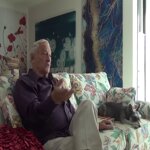| Title |
Waterfall, Clarence OH3_052 |
| Creator |
Weber State University, Stewart Library: Oral History Program. |
| Contributors |
Waterfall, Clarence, Interviewee; Harris, Kandice, Interviewer; Kenner, Marina, Video Technician |
| Collection Name |
Weber State University Oral Histories |
| Description |
The Weber State University Oral History Project began conducting interviews with key Weber State University faculty, administrators, staff and students, in Fall 2007. The program focuses primarily on obtaining a historical record of the school along with importand developments since the school gained university status in 1990. The interviews explore the process of achieving university status, as well as major issues including accreditation, diversity, faculty governance, chagnes in leadership, curricular developments, etc. |
| Abstract |
The following is an oral history interview with Clarence Waterfall, conducted on October 21, 2021 at Clarence's home by Kandice Harris. In this interview Clarence discusses his family history in Ogden, his life, his career, his time as a student at Weber State from 1961-1963, and his time as an English professor at Weber State University from 1965-2005. |
| Subject |
Weber State University; Travel; Teaching; English |
| Keywords |
Weber State Univeristy; Travel; Teaching; English |
| Digital Publisher |
Stewart Library, Weber State University, Ogden, Utah, United States of America |
| Date |
2021 |
| Date Digital |
2021 |
| Temporal Coverage |
1930; 1931; 1932; 1933; 1934; 1935; 1936; 1937; 1938; 1939; 1940; 1941; 1942; 1943; 1944; 1945; 1946; 1947; 1948; 1949; 1950; 1951; 1952; 1953; 1954; 1955; 1956; 1957; 1958; 1959; 1960; 1961; 1962; 1963; 1964; 1965; 1966; 1967; 1968; 1969; 1970; 1971; 1972; 1973; 1974; 1975; 1976; 1977; 1978; 1979; 1980; 1981; 1982; 1983; 1984; 1985; 1986; 1987; 1988; 1989; 1990; 1991; 1992; 1993; 1994; 1995; 1996; 1997; 1998; 1999; 2000; 2001; 2002; 2003; 2004; 2005; 2006; 2007; 2008; 2009; 2010; 2011; 2012; 2013; 2014; 2015; 2016; 2017; 2018; 2019; 2020; 2021 |
| Medium |
Oral History |
| Spatial Coverage |
Ogden, Utah; Kaysville, Utah; West Weber, Utah; Switzerland; Budapest, Hungary; Buenos Aires, Argentina; Copenhagen, Benmark; Dubai; Idaho; Turin, Italy; China; Indonesia |
| Type |
Text; Image/StillImage; Image/MovingImage |
| Access Extent |
58 page PDF; Video clip is an mp4 file, 130 MB |
| Conversion Specifications |
Filmed using a Sony HDR-CX430V digital video camera. Sound was recorded with a Sony ECM-AW3(T) bluetooth microphone. Transcribed using Trint transcription software (trint.com) |
| Language |
eng |
| Rights |
Materials may be used for non-profit and educational purposes, please credit University Archives; Weber State University |
| Source |
Waterfall, Clarence OH03_052 Weber State University Archives |
| Format |
application/pdf; video/mp4 |
| ARK |
ark:/87278/s6nm53wr |
| Setname |
wsu_oh |
| ID |
111932 |
| Reference URL |
https://digital.weber.edu/ark:/87278/s6nm53wr |
| Title |
Waterfall, Clarence OH3_052 |
| Creator |
Weber State University, Stewart Library: Oral History Program. |
| Contributors |
Waterfall, Clarence, Interviewee; Harris, Kandice, Interviewer; Kenner, Marina, Video Technician |
| Description |
The Weber State University Oral History Project began conducting interviews with key Weber State University faculty, administrators, staff and students, in Fall 2007. The program focuses primarily on obtaining a historical record of the school along with importand developments since the school gained university status in 1990. The interviews explore the process of achieving university status, as well as major issues including accreditation, diversity, faculty governance, chagnes in leadership, curricular developments, etc. |
| Abstract |
The following is an oral history interview with Clarence Waterfall, conducted on October 21, 2021 at Clarence's home by Kandice Harris. In this interview Clarence discusses his family history in Ogden, his life, his career, his time as a student at Weber State from 1961-1963, and his time as an English professor at Weber State University from 1965-2005. |
| Image Captions |
Clarence Waterfall 1965-1970; Clarence Waterfall 2021; Clarence and Margaret Waterfall 2022 |
| Subject |
Weber State Univeristy; Travel; Teaching; English |
| Keywords |
Weber State Univeristy; Travel; Teaching; English |
| Digital Publisher |
Stewart Library, Weber State University, Ogden, Utah, United States of America |
| Date |
2021 |
| Date Digital |
2021 |
| Temporal Coverage |
1930; 1931; 1932; 1933; 1934; 1935; 1936; 1937; 1938; 1939; 1940; 1941; 1942; 1943; 1944; 1945; 1946; 1947; 1948; 1949; 1950; 1951; 1952; 1953; 1954; 1955; 1956; 1957; 1958; 1959; 1960; 1961; 1962; 1963; 1964; 1965; 1966; 1967; 1968; 1969; 1970; 1971; 1972; 1973; 1974; 1975; 1976; 1977; 1978; 1979; 1980; 1981; 1982; 1983; 1984; 1985; 1986; 1987; 1988; 1989; 1990; 1991; 1992; 1993; 1994; 1995; 1996; 1997; 1998; 1999; 2000; 2001; 2002; 2003; 2004; 2005; 2006; 2007; 2008; 2009; 2010; 2011; 2012; 2013; 2014; 2015; 2016; 2017; 2018; 2019; 2020; 2021 |
| Medium |
Oral History |
| Spatial Coverage |
Ogden, Utah; Kaysville, Utah; West Weber, Utah; Switzerland; Budapest, Hungary; Buenos Aires, Argentina; Copenhagen, Benmark; Dubai; Idaho; Turin, Italy; China; Indonesia |
| Type |
Text; Image/StillImage |
| Access Extent |
58 page PDF |
| Language |
eng |
| Rights |
Materials may be used for non-profit and educational purposes, please credit University Archives; Weber State University |
| Source |
Waterfall, Clarence OH03_052 Weber State University Archives |
| Format |
application/pdf |
| Setname |
wsu_oh |
| ID |
111986 |
| Reference URL |
https://digital.weber.edu/ark:/87278/s6nm53wr/111986 |





